Washington State has such a high payout of child welfare lawsuits strictly because there are bold attorneys who are not afraid to brandish the facts, in a court of law, of what happens to a child in foster care.
In most states, particularly Michigan, the legal profession has an unspoken code of being "blacklisted" if an attorney goes up against the state in a matter of child welfare. Then there is that pesky matter of one being able to afford an attorney to represent their child, or even themselves as the parent.
The stigma of being involved with Child Protective Services is so deeply embedded in social culture that it makes sense for everyone to remain silent, even the children who are, for whatever reason (i.e. unnecessarily, involuntarily, poverty) so that no political leader will directly touch this "tar baby" a ten-foot pole.
I must give credit to to Congresswoman Karen Bass and her founding of the Congressional Caucus on Foster Youth but it is a dearth, if any, activity in addressing the structural issues of the entire foster care system, mainly the billing and civil rights.
Political candidates of both sides of the aisle only have joined the aforementioned congressional caucus for D.C. political posturing, and not even for their constituents. I can attest, personally, first hand knowledge, that Congressional Chiefs of Staff will ignore and omit anything dealing with the child welfare system from the Offices.
(I would name names, but I believe it will be much more enjoyable to sit back and watch certain Chiefs of Staff to be escorted off the Hill.)
Why? Because they consider this to be a state issue and have never taken the time to even investigate as child welfare is a closed, secretively administered system.
State political leaders will vehemently exclude anything about child welfare from their rhetoric as it comes across as defending bad parents and an hindrance in helping the "poor, abused kids".
Child welfare is the last frontier of civil rights. Stated in this article, reiterated by my previous scribings, children have no civil rights because they do not pay taxes and cannot vote.
DSHS employees rarely pay a price for failing to protect foster children
The state of Washington’s largest department is tasked with caring for the state’s most vulnerable residents — abused children, foster kids, mentally handicapped adults. But time and again, it has failed.
Over the past eight years, the Washington state Department of Social and Health Services (DSHS) has been hit with scores of lawsuits, ultimately paying $166.4 million for personal-injury claims. Many of the most severely injured were children who were tortured, starved or raped. Some died.
DSHS employees behind these failures rarely are punished, The Seattle Times has found.
From those scores of lawsuits, the newspaper selected one dozen of the high-cost, child-welfare cases for which records were readily accessible. Many of these cases made headlines and resulted in verdicts or settlements ranging from $750,000 to $11 million, some $75 million in all.
Using court records, public records and interviews, the newspaper identified 48 DSHS staffers involved in the failures in these 12 cases.
None of the 48 was fired or suspended. None was demoted or lost pay.
That is according to DSHS, which ran the 48 names through its human-resources databases at the newspaper’s request. (The database only shows records that affect compensation.)
Whether any of the 48 staffers were given lesser forms of discipline, such as reprimand letters, is unclear. DSHS in May said it would takes several months to provide answers. (Recently, the agency said one staffer had been given a letter of reprimand. It hasn’t completed its research.)
Slightly less than half the 48 still work for DSHS; some have retired.
The review of the 12 cases — as well as several dozen interviews with present and former DSHS employees, state employee-union officials, personal-injury lawyers, children’s advocates and others — turned up some common failings: overlooked complaints of abuse; delayed or inept investigations; placement of children in unsafe homes.
DSHS’ lack of focus on personal accountability is a significant problem, said Tim Tesh, a personal-injury lawyer who has sued DSHS many times. Policymakers can suggest reforms, he said, but “often, it’s that the worker didn’t follow procedures that are already in place. What good does reform do you when the worker just doesn’t follow them?”
DSHS said paying a victim does not mean an employee made a mistake.
“I don’t think anyone in the field can credibly deny that there’s a scary connection between overburdened workers and risk of harm to kids.” - Ira Lustbader, litigation director of Children’s Rights"
“I don’t think anyone in the field can credibly deny that there’s a scary connection between overburdened workers and risk of harm to kids.” - Ira Lustbader, litigation director of Children’s Rights"
Jennifer Strus since 2013 has been head of the Children’s Administration, the division responsible for payouts of $141.4 million. She would not comment on how her predecessors handled employees who may have made mistakes years earlier.
Any failures must be well-documented before the agency can take action, she noted. DSHS in recent years has improved training and how it tracks complaints of abuse and also reviews the performance of employees implicated in claims against the agency.
Being a social worker is the “toughest job in state government,” Strus said. A combination of large caseloads, employee turnover and budget cuts makes it “pretty hard to do great work,” she said.
Cheryl Schaefer, 28, isn’t comforted by these words. She and three siblings suffered years of abuse in a foster home under DSHS supervision in northeastern Washington. Up until 2001, court records show, they were beaten, forced to overeat, throw up and eat their own vomit, and suffered sexual abuse.
According to court records, Schaefer and her siblings said the caseworker repeatedly ignored their cries for help.
A 2012 lawsuit, filed by Tesh against DSHS, was settled for $5.3 million. To Schaefer, money does not equal justice.
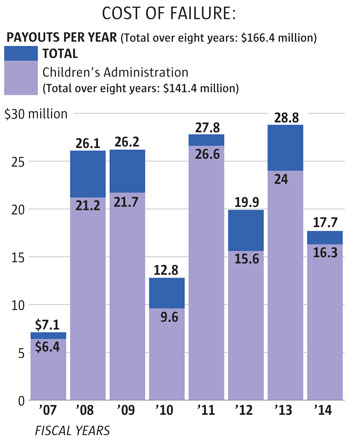
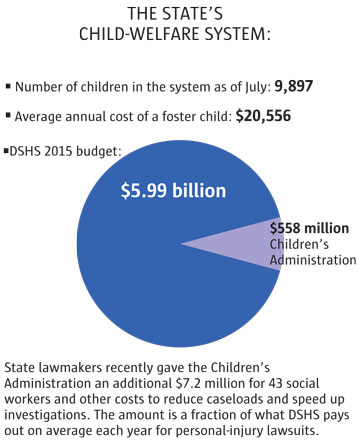
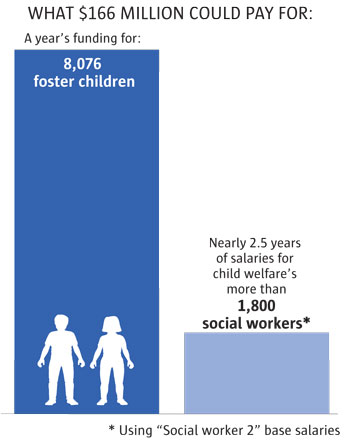
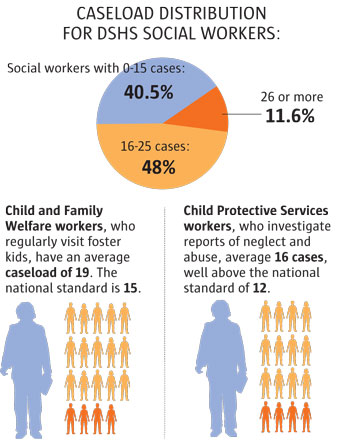
Sources: Washington Department of Social and Health Services; Washington Department of Enterprise Services (Reporting by Will Drabold / The Seattle Times; Graphic by Mark Nowlin / The Seattle Times)
Paying for mistakes
DSHS paid out $166.4 million over eight years for injury claims. The largest cases involved the Children’s Administration, its child-welfare division.



Sources: Washington Department of Social and Health Services; Washington Department of Enterprise Services (Reporting by Will Drabold / The Seattle Times; Graphic by Mark Nowlin / The Seattle Times)
“I can’t do my job”
Complaints about how DSHS handled foster kids and reports of child abuse
have tagged the agency for years. In 1998, lawyers for 13 foster kids filed a class-action lawsuit against the state, saying foster children were being harmed across the board by inadequate care. The state Supreme Court, in the landmark 2003 Braam decision (named after one of the plaintiffs), upheld a lower court and put Washington’s child-welfare system under judicial oversight.
The Braam case led to several improvements, including sharply cutting back on children bouncing from one foster home to another. The court oversight continues, in part because a key court-ordered mandate remains unfulfilled: foster-child caseloads of 18 or fewer for 90 percent of social workers.
Besides the court, state lawmakers recently required DSHS to be more accountable for mistakes.
DSHS was required to do automatic reviews of botched child-welfare cases only when someone died in state care, a “fatality review.”
DSHS was required to do automatic reviews of botched child-welfare cases only when someone died in state care, a “fatality review.”
As of July 24, under “Aiden’s Law,” DSHS must review worker actions if a child experiences a “near fatality” within one year of a previous incident of abuse.
State Sen. Steve O’Ban, R-University Place, who sponsored the legislation, called it an improvement. That lawmakers had to force DSHS to review such cases “speaks volumes,” he said.
Most of the multimillion-dollar settlements come from the DSHS Children’s Administration division. There more than 1,800 social workers oversee nearly 10,000 children in foster care and last year looked into 90,000 reports of child neglect or abuse. Turnover is high — about one in six staffers leaves each year. Starting pay can be as low as $32,688.
Joyce Murphy, a social worker in Vancouver who’s worked for a decade at the agency, said she has failed to see children once a month, as required by DSHS policy. She blames it on her caseload, which she says over the past four years has averaged about 25 children — well above the national standard of 15 and the DSHS average of 19.
"When we are some 30 percent above a reasonable caseload, that can be like sending the Seahawks to play the Super Bowl with two-thirds of a team, then firing them when they lose.” - Kevin Quigley, DSHS Secretary"
“I can’t do my job,” she said. She worries each night that one of her clients will die on her watch.
No one died in the case of two young Snohomish County boys, ages three and six, who were being starved and beat by their father and his girlfriend in 2006, but it does illuminate the tragic results when workers utterly fail to do their jobs. The case is one of many that reveals the personal consequences for such failures can be slight.
Between May and July 2006, a neighbor filed four complaints with DSHS, saying two young boys were being starved and beaten by their parents. She would later say that no one at DSHS ever followed up with her, court records show.
The father, Danny Abegg, and his girlfriend, Marilea Mitchell, kept a padlock on the refrigerator and withheld food to punish the boys. A social worker, Aubrey Kilgore, in one visit reported that the house “had plenty of food in it.”
He went back a second time after a sheriff’s deputy, shopping at Wal-Mart, saw bruises on the face of the 3-year-old, and alerted DSHS. This time, Kilgore required the parents to see a family therapist, documents show.
The child-welfare case was transferred that fall to another social worker, Deanna Neff. Among her failures, she gave Abegg eight-days notice she would be visiting the home, giving him time to hide evidence of abuse. Nor did she speak to the more severely abused younger brother, Shayne, records show.
A few months later, Ada Sharp, who had no experience or training investigating child abuse, was given the case, court records show. Other warning signs surfaced, records show, but Cherokee Screechowl, the area supervisor, ended the investigation in February 2007.
A month later, someone alerted authorities that a little boy was being “starved.” Paramedics rushed Shayne, now 4, to the hospital where he was found in urine-soaked clothes, emaciated, with a body temperature of 87 degrees. After being given food at the hospital, the boy told doctors not to let his parents know that he had eaten. A veteran paramedic later said he had not seen “a worse case of neglect or malnourishment.”
After Abegg and Mitchell were charged with first-degree criminal mistreatment, the case, with its sickening details and claims of DSHS failures, exploded in the news. Gov. Chris Gregoire asked for a special review, and DSHS said its employees failed to protect the two boys.
At the time, a DSHS spokesman said two employees linked to the case had resigned. DSHS recently said one of the four did receive a letter of reprimand.
Kilgore and Sharp still work at DSHS. Neff resigned from the agency. Screechowl resigned in 2007, came back in 2011 and then re-retired.
Screechowl could not be located; the other did not return calls for comment.
Shayne Abegg received $5 million from the state in 2009 after a judge compared him to a concentration-camp survivor. His older brother received $2.85 million two years later.
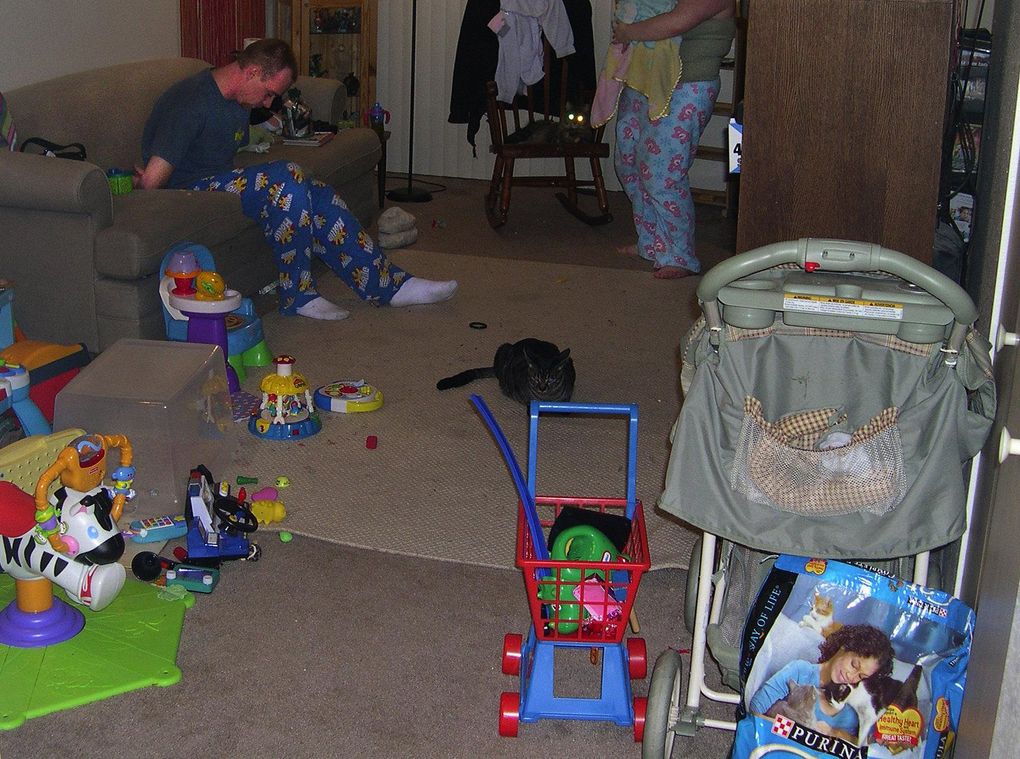
“It is a war zone”
If the high-profile Snohomish stavation case didn't result in someone being punished, what sort of case would?
“This story has been going on for 30 years,” said Dennis Braddock, DSHS secretary from 2000 to 2005. He oncedescribed DSHS’ culture as “bunkerlike” and said he tried to hold staffers to account but faced an uphill battle.
“Republicans don’t like administration,” he recently said. “Democrats all side with the union. So management gets the short end of the stick in [employee] disputes.”
It’s a proven formula: To effectively serve children and families, social workers need a reasonable number of cases to manage, a finding backed by decades of state and national studies.
Currently, the average caseload for child-protective-services (CPS) workers — Children’s Administration employees who investigate reports of child neglect — is 16, well above the national standard of no more than 12. Also, it takes on average two years for a CPS investigator “to become proficient,” DSHS said.
Since 2008, the Children’s Administration has lost 300 employees. This year, for the first time since, the division received an additional $7.2 million for 43 employees and other resources, an attempt to lower caseloads and improve investigations.
Greg Devereux, executive director of the Washington Federation of State Employees, which represents unionized DSHS staff, describes social-worker caseloads, burnout and turnover in dire terms: “It is a war zone.”
Some former DSHS officials and child advocates point to his union when noting that individual discipline doesn’t always occur. DSHS is required to have substantial documentation to punish negligent employees, they assert, and the arbitration process can be time-consuming.
“That’s ridiculous,” Devereux said. The union makes sure DSHS “fairly holds people accountable.”
In the past eight years, the union went to arbitration on only two cases of Children’s Administration social workers who were terminated, he said. One firing was upheld; the other employee was reinstated.
“I don’t think anyone in the field can credibly deny that there’s a scary connection between overburdened workers and risk of harm to kids,” said Ira Lustbader, litigation director of Children’s Rights, a national organization that advocates and files lawsuits to bring accountability to child-welfare systems.
Lustbader’s organization has filed lawsuits in other states arguing high caseloads are a civil-rights violation for children because it puts them in harm’s way.
“They’re poor. They’re disproportionately of color. They’re not a legislative priority.”
“These kids don’t vote. They’re poor. They’re disproportionately of color. They’re not a legislative priority,” he said.
Not held accountable
Even so, heavy caseloads cannot always explain away mistakes or why they go unpunished. According to interviews with 10 plaintiff attorneys who have brought personal-injury cases against DSHS, none of them has heard of a social worker being disciplined for failing to protect someone.
David Moody is a Seattle lawyer who has brought lawsuits against DSHS that resulted in $86 million in verdicts or settlements since 2000. “There’s a constellation of warnings and a corresponding constellation of failures by DSHS to heed those warnings,” said Moody, lawyer for the Abegg children. “No one is held accountable.”
DSHS Secretary Kevin Quigley declined to be interviewed. In an email, he wrote that the agency has an improved performance-evaluation system and is more aggressive about dismissing subpar workers during their probation period.
“I understand the solution for some is to blame the caseworker every time a mistake is made but when we are some 30 percent above a reasonable caseload that can be like sending the Seahawks to play the Super Bowl with 2/3 of a team then firing them when they lose,” Quigley wrote.
Some officials note that the state does have another tool to hold DSHS accountable: The Office of Family and Children’s Ombuds. Director Patrick Dowd says the office plays a neutral role when it intervenes in cases in which DSHS failed to act or was unreasonable.
“I understand the solution for some is to blame the caseworker every time a mistake is made but when we are some 30 percent above a reasonable caseload that can be like sending the Seahawks to play the Super Bowl with 2/3 of a team then firing them when they lose,” Quigley wrote.
Some officials note that the state does have another tool to hold DSHS accountable: The Office of Family and Children’s Ombuds. Director Patrick Dowd says the office plays a neutral role when it intervenes in cases in which DSHS failed to act or was unreasonable.
However, he said, his office’s “focus is on the actions of the agency and not the specific caseworker.”
Voting is beautiful, be beautiful ~ vote.©
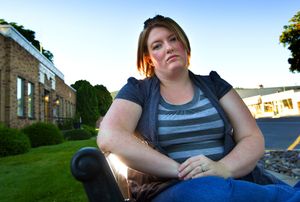
No comments:
Post a Comment